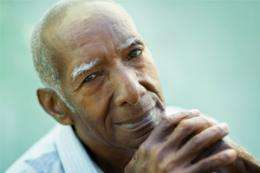Half of at-risk older adults aren't getting routine HIV screening

One in four people with HIV/AIDS is over 50, yet older adults are more often diagnosed at a late stage than younger people. Despite this, nearly half of older adults visiting a public health clinic where HIV/AIDS is prevalent were not screened for the disease in the past 12 months, finds a study in The Gerontologist.
"It is concerning that none of the participants in the study were automatically tested," said Chandra L. Ford, Ph.D., MPH, MLIS, assistant professor in the department of community health sciences at the University of California at Los Angeles. "In the venues where we recruited patients, they provide HIV testing and HIV/AIDS care, and yet, the CDC guidelines, which have been in effect since 2006, are not being followed for older adults, even for those who are considered higher risk such as injection drug users, and sexually transmitted disease patients," she said.
The cross-sectional study sought to examine whether misinformation and government mistrust played a role in the decision to be screened. The study included 226 adults of various racial and ethnic backgrounds, over 50-years-old who had participated in the LA VOICES study in Los Angeles. All of the adults were patients at public health venues, including needle-exchange sites and STD clinics, and none had been diagnosed with HIV.
About 72 percent of the adults surveyed had high levels of mistrust of the government. Interestingly, thirty percent of participants believed that AIDS was a man-made disease designed to wipe out targeted groups of people. However, people who believed in conspiracy theories like these were more likely to have gotten tested for AIDS in the past year, suggesting that testing that is done early and often gives people the opportunity to avoid or control their fears.
Richard Birkel, Ph.D., senior vice president for health at the National Council on Aging in Washington, D.C. said this type of study is good for generating questions for future research. "While it is clear that HIV/AIDS is a serious public health problem among older adults and that many are not availing themselves of opportunities to be tested, the study does not provide clear direction for practice or policy change. For example, many people who mistrusted the government did get tested—what accounts for that difference? Is it feelings of hopelessness or the belief that one can make a difference by taking action?"
Ford added it is crucial that health care providers not overlook screening opportunities to diagnose HIV early, especially among vulnerable adults. "Otherwise, when HIV infection finally is diagnosed, the disease will be more advanced, more difficult to manage and more costly for HIV patients as well as for taxpayers."
More information: Ford, C. et al. (2013). Belief in AIDS-Related Conspiracy Theories and Mistrust in the Government: Relationship with HIV Testing among At-Risk Older Adults. The Gerontologist.

















